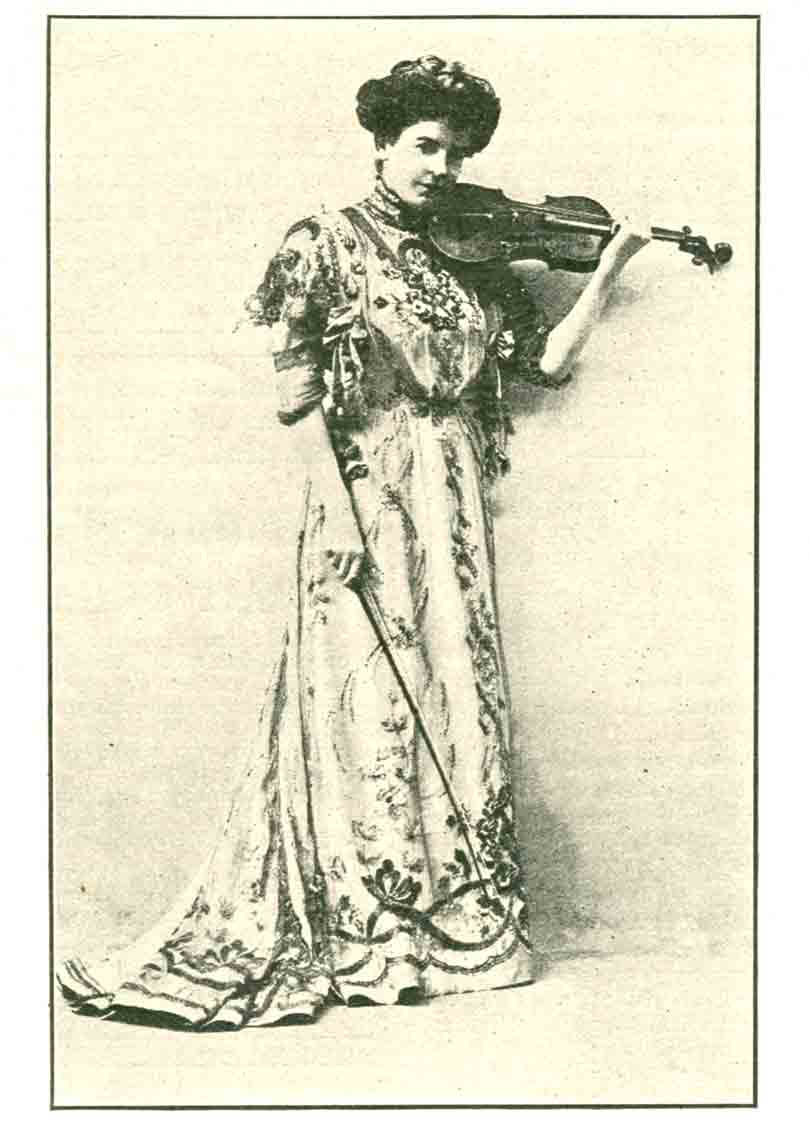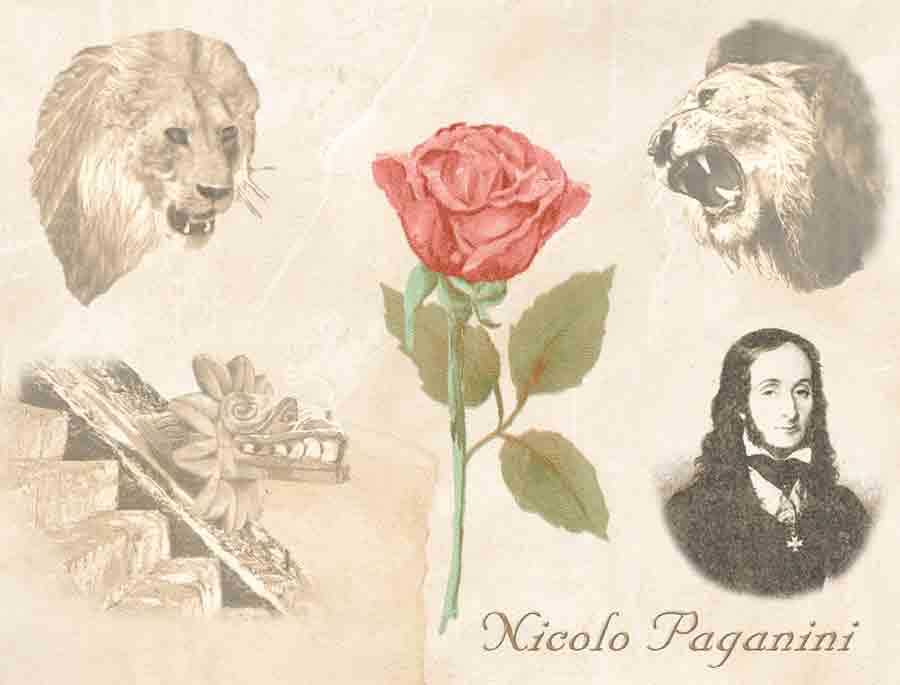
Maud Powell
Maud Powell, niece of famous explorer John Wesley Powell, violinist extraordinaire was born in Peru, Illinois, U.S.A. in 1867 and at the age of two began her musical education. She later studied with Mr. William Lewis of Chicago for four years before going to Leipzig to study with Professor Schradieck in 1880 (age thirteen). A year later she was awarded a diploma in Gewandhaus. In Paris she studied with Mons. Charles Dancla and soon after began performing concerts in London and before the Royal Family. Her American concert debut was in New York under the baton of Theodore Thomas and so perfect is her technical skill that she has been called “The Lady Paganini” ; but she doubtless values more highly the references made by leading European and American critics to her “Thrilling tone,” Magnificent abandon,” Marvelous sense of rhythm,” “Subtle feminine charm,” “Magnetic Personality,” and “Lavish display of temperament.”
Her repertory is extensive and she is responsible for introducing Arensky's Violin Concerto, Dr. Dvorak's Violin Concerto in America, Saint Saen's Concerto in C minor; Lalo's Concerto in G major, etc. As they say, the rest is history.
Recordings
by Miss Powell
Presented by: The National
Jukebox
/The Library of Congress
Caprice,
op. 51, no. 2
Composer:
Michael Ogarew
Performed:
September 27, 1912 New York,
New York
3 minutes 13 seconds
Mélodie
Composer:
Christoph Willibald Gluck
Performed:
May 20, 1909 Camden, New Jersey
2 minutes 43 seconds
Take heart, young musicians - Beethoven himself said: “The barriers are not erected that shall say to talent, 'Thus far and no further.'”
Cultivate courage. Have a oneness of purpose. Keep at it. Go on trying.
I have heard a pupil play, and play creditably, a piece full of difficulties that she had utterly balked at in the beginning. Her imagination had magnified the difficulties out of all proportion, and had diminished her own powers of achievement in inverse ratio.
Try!
You do not know what you can do till you have tried. I am always disappointed in the girl who, on being introduced to me after a concert, says, “Oh, Miss Powell, I feel as if I never could touch the violin again - it seems so hopeless now.” Much more to my liking is the girl who says, in a scarcely audible voice, “Oh, I feel as though I could do anything now - I just feel inspired!”
Of course, enthusiasm is going to help you along. There are plenty of hard places to be conquered, but enthusiasm will make them easier.
As for opportunity, apathy will prevent you from seeing it, and a lack of courage from seizing it.
American women, especially, have a good sense of rhythm. They are adaptable and conscientious, with endless patience for detail.
Ten Practice Rules.
1. Concentrate. Concentrate your thoughts on your work, completely and absolutely. One hour of absorbed practice is worth forty of the casual sort.
2. Play in tune. The worst of all violinistic crimes is to be untrue to pitch.
3. Practice scales religiously. Play them slowly and with perfect evenness, both as to fingering and bowing.
4. Practice slowly all difficult or intricate passages; also, jumps, trills, spiccato, staccato, arpeggios, etc.
5. Practice long bows slowly, slowly, slowly. Draw out the tone. Pull it out, spin it, weave it, but never press it out or squeeze the string. By pressing the string with the bow you can check the natural vibration, and without changing the position of the left hand the smallest fraction, you can actually lower the pitch of the note you are producing
6. Memorize everything, including scales, etudes, pieces and difficult passages in chamber music.
7. Keep in mind the structure of the composition while practicing separate phrases, difficult passages, et. Do not let your playing or your memory become “patchy” - keep each measure mentally in its place; that is, in its correct relation, structurally, to the whole.
8. “Vorspielen.” This German word means “to play before.” Play your studies or pieces over in their entirety before any long-suffering friend who will listen. You will be amazed at the sore spots that will reveal themselves, and will make it your business to heal them as quickly as possible.
9. Hear other violinists. You will listen in spite of yourself. Then apply that kind of listening to your own work. There will be more surprises in store for you.
10. Love you instrument as yourself. But love your art more than either. Keep the fires of enthusiasm burning. Nothing was ever accomplished without faith and enthusiasm.
Every violinist should play the piano.
You will be at a great disadvantage if you cannot study your repertoire from the piano score. You will lose much by not being able to play accompaniments. What can you get out of a new composition if you can look over only the violin part? If you play the piano, the complete score is yours. The whole literature of music is yours; symphonies, operas, quartets, songs, et al., if you play the piano.
A student must also study the theoretical, structural part of music - harmony, counterpoint, form and composition. Without these, you play without comprehension, memorizing by rote, phrasing parrot-like. You trust a little to taste, but more to luck. When reading a new composition, you do not know where the second theme begins, you are in a wilderness when you reach the “development,” and fail to anticipate in time that you are coming to the “recapitulation.” How can you convey anything of the composer's meaning to others if you know nothing of it yourself?
Hints on Memorizing.
No two people memorize in the same way:
Some see the printed page before their mind's eye while playing from memory. This I personally cannot understand. However, if it helps you to remember exactly how that difficult bar in the second staff on page nine looks in print, then by all means use that method.
But before learning any new composition, get its structure well in mind. Analyze its different parts, and knit them together, bearing in mind their relative bearing to each other.
Always use the same fingering: for in an emergency, the fingers will carry you through an uncertain passage from sheer force of habit.
Memorize Bach = and more Bach. Memorize Bach on the piano. He is complex, intellectual, full of musical fibre, and should be daily food. He is more than food; he is an intellectual tonic. And you will find that all others will seem easy after Bach. But guard against the stiff wrist in the right hand and against stiff wrist and fingers in the left. He demands strength in the right arm, which stiffens your bowing if you are not careful. And he keeps your left hand so much in one position that you will lose elasticity in both wrist and fingers if you do not conscientiously guard against the tendency to tighten muscles. You must constantly think of flexible firmness when you play Bach.
Care of the violin.
Put you instrument away, always, when not in use. Keep it free from dust and rosin. Keep the violin box in a place of even temperature - not too near a heater or a window. The floor is cold or draoughty, a high shelf too hot and dry, especially in winter. Keep water on the heater in winter. The evaporation will be good for yourself as well as your instrument.
Many a time, when traveling at night, in zero weather, I have put the violin case under the blankets in my berth, as carefully as though it were a live thing. On one occasion my train was delayed nine hours by a blizzard. The steam pipes froze - so, very nearly, did the passengers - and all that day I kept the violin wrapped in blankets, much more worried over it than about myself. I was to give a recital that night, and only arrived in town at eight o'clock, but when I walked on the stage at ten minutes of nine, I found th violin in a splendid condition, thanks to my care.
Treat it like a tender human being, and invite its soul - and your own.
-- Maud Powell
